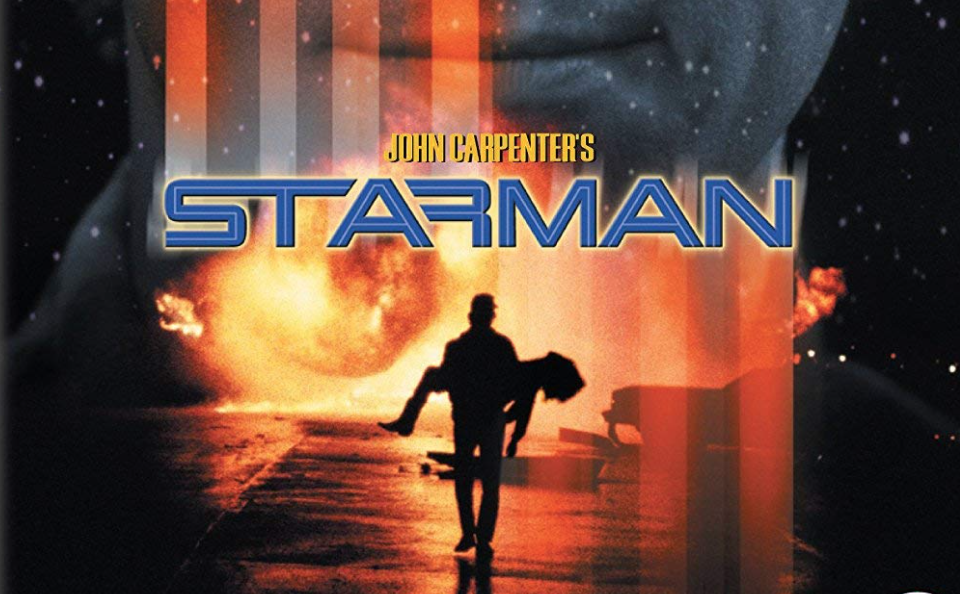While it might be deemed “every woman’s fantasy” (from the viewpoint of the patriarchy) for a “moldable man” to land in one’s house in the middle of the night, Jenny Hayden (Karen Allen) is none too thrilled when an alien creature appears in the small hours of some arbitrary morning. Not only “appears,” but adopts the physical attributes of her recently deceased husband, Scott (Jeff Bridges). After having spent the night drinking wine and watching old home movies of her and her husband before he died in an accident, Jenny settles in to sleep. Making the assumption that no one will bother her in her remote Chequamegon Bay cabin.
But Cupid or whoever seems to have other ideas, for soon after she goes to bed, a spacecraft homes in on the area, landing in the woods and setting the trees ablaze with the crash. “Starman” (also Jeff Bridges) then flies toward the safe haven of Jenny’s abode so that he might find someone’s DNA to copy in order to adopt a human form–specifically, Scott’s. Looking at the photo album featuring him and Jenny, Starman sees a lock of hair (ah, the sentimentally tactile opportunities allowed by the past) taped inside of it. That will do quite nicely. He then studies Scott’s mannerisms in video and photo format long enough to pick up something of his cadence and behavior. Clearly, his resemblance to Scott alone is ultimately effective enough to get Jenny to do as he says, carting him toward Arizona in a car that was once broken down, but now works thanks to Starman’s powers.
Because it’s the 80s, no movie would be complete without the National Security Agency making reference to the Cold War, which is why when the “activity” of Starman’s spacecraft is first detected, it’s brought to the attention of the agency’s director, George Fox (Richard Jaeckel), who insists, “Sounds like Soviet space junk.” But no, the Soviets know nothing about it, which is both exciting and horrifying. Especially to SETI scientist Mark Shermin (Charles Martin Smith), who instructs the various lines of defense sent out to search for Starman to inform him of anything that seems “freaky.”
And yes, Starman can’t help but let his freak flag fly while on the road with Jenny. This is foreign territory to him, after all–and he certainly knows nothing of the bizarre Earthling customs. Indeed, their base, primeval nature comes across as completely archaic to him. For he indicates to Jenny that his own planet is some kind of utopia, where no one fights one another, least of all over trivial things like “border control” and “jurisdiction.” Fittingly, Starman was released in 1984, the same year the Soviets announced they were boycotting the Olympics in Los Angeles. This presumed to be in retaliation for the U.S. not participating in the Moscow games in 1980. Real Petty Betty bullshit, in other words.
In any case, Starman spent five years in development hell, spurred by the producers and writers scrambling to differentiate the script from the runaway hit that was E.T. Taking their time with it also proved kismet when John Carpenter eventually signed on to direct. Wanting to break away from the kinds of movies that had thus far made him well-known (Halloween, The Thing and Escape From New York), it was Carpenter’s unique vision that played up an angle beyond merely the “sci-fi” or “alien movie.” Instead, his intent was to develop the “road trip” aspect of the story, which was what allowed the romance between Jenny and Starman to blossom so authentically (the 1930s classic It Happened One Night being a frame of reference for Carpenter).
Through this lens, Jenny really does start to have feelings for the man occupying her husband’s form, which would be rather convenient if Earth was actually hospitable to his needs. And, to say the least, it means she has a type. The Lynchian moments (Dune, incidentally, was released in ’84 as well)–in terms of evoking a true slice of American life–also come out in the most normal of settings. Namely, a roadside diner where Starman has his first experience with Dutch apple pie, sending his taste buds on an orgasmic journey. Throwing his assessment of Earth back in his face, Jenny remarks, “For a primitive species, we have our points.” Including the ability to love.
Starman and his ilk obviously have no concept of it, which would make sense if they also have no notion of what hate is either (ergo no desire to battle one another as the Earthlings do). Thus, like some kind of computer, he demands, “Define ‘love.’” Jenny slowly explains, “Love is when you care more for someone else than you do for yourself. But it’s not just that… it’s when someone is a part of you.” Not a bad explanation for being reduced to something so simple.
As their road trip wears on, Jenny realizes that once she actually gets a perfect chance to run away from him, she can’t bring herself to do so. She’s reached that point where she’s started to care for Starman more than she does for herself. A pair of star-crossed lovers, if ever that term were to apply in the most literal of senses.




















